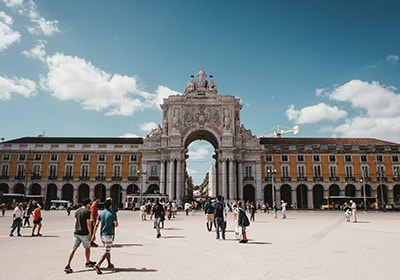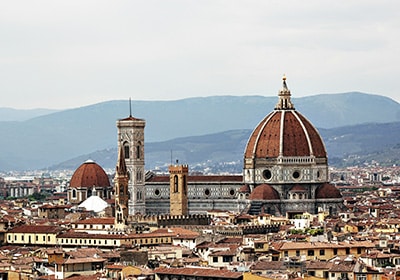Dreaming of retiring or relocating to Europe under a passive income visa—but unsure whether Portugal or Italy offers the better route? You’re not alone. Both countries provide attractive residency options, and choosing the right one could shape your future.
The Portugal D7 Visa and the Italy Elective Residency Visa are designed for non-EU citizens with stable passive incomes who want to live in Europe without investing large sums or seeking employment. Both visas offer an enviable lifestyle, EU mobility, healthcare access, and citizenship.
This guide will break it down so you can confidently make the right move, read on to find:
Portugal D7 Visa vs Italy Elective Residency Visa Compared
Portugal D7 Visa Program

Who it’s for:
- Retirees wishing to settle in Portugal.
- Non-EU citizens with a stable income from pensions, dividends, royalties, or rental properties.
Key Requirements:
- Minimum passive income equal to or above the Portuguese minimum wage — €870/month in 2025.
- Proof of savings: a Portuguese bank account with at least €10,440 (equivalent to 12 months of income) at the time of application.
- Additional funds are required per family member: €5,220 for a spouse and €3,132 for each dependent child.
- Suitable long-term accommodation (either owned or rented for at least 12 months).
- Health insurance that covers medical expenses in Portugal.
- No serious criminal record.
Italy Elective Residency Visa Program

Who it’s for:
- Retirees and financially independent individuals.
- Non-EU citizens with substantial, continuous, and stable passive income (from pensions, real estate, annuities, or investments).
Key Requirements:
- A minimum passive income of €32,000/year for a single applicant.
- For couples, the minimum rises to €38,000/year, with an additional 5% per dependent.
- Income must not come from employment or remote work.
- A signed lease (minimum one year) or property deed in your name is required, and must be registered with the Agenzia delle Entrate. (hotels or temporary lodging are not accepted).
- Proof of health insurance with coverage of at least €30,000/year.
- No criminal record.
- Motivation letter proving your intention to settle permanently in Italy.
Portugal D7 Visa vs Italy Elective Residency Visa Benefits
Portugal D7 Visa
- Work & Remote Income Flexibility: D7 visa holders can work as employees, freelancers or remote employees, giving digital nomads a legal route to live and work in Portugal.
- Schengen Travel Access: Enjoy free movement across 27 Schengen countries.
- Healthcare Access: After securing a residence permit, D7 visa holders can enroll in the Portuguese national health system (SNS), known for its affordability and high standards.
- Family Reunification: Includes spouse/partner, children, and dependent parents. Each dependent must meet additional income thresholds.
- Education Rights: Access to Portugal’s public education system and eligibility to apply for recognition of foreign academic degrees. · Citizenship in Five Years: Offers a fast track to EU citizenship compared to most other programs.
- Cost of Living: Generally more affordable compared to Italy, especially in areas like the Algarve or smaller towns.
Italy Elective Residency Visa
- Elegant Lifestyle Access: Perfect for those seeking an authentic Italian lifestyle—mild Mediterranean climate, rich culture, art, and cuisine.
- Schengen Area Mobility: Travel across Europe’s Schengen Zone without border restrictions.
- Healthcare: After obtaining the resident permit (permesso di soggiorno), applicants can register with Italy’s public health service (SSN) for full medical coverage.
- Family Reunification: Spouses, minor children, and dependent adult children can join the primary applicant under specific financial conditions.
- Path to Permanent Residency: After five years of continuous residence, provided all requirements remain fulfilled.
- Dual Citizenship Allowed: Italy allows dual or even multiple citizenships, enabling long-term global flexibility.
- Tax Benefits for New Residents: The 7% flat-tax regime for foreign pensioners or the “non-dom” flat tax option (€100K/year) for high-net-worth individuals.
- ETIAS & EES Exemption: Elective Residency Visa holders are exempt from future travel system registrations that will apply to short-stay visa holders and visitors from visa-waived countries.
Portugal D7 Visa vs Italy Elective Residency Visa Processing time
The Portugal D7 Visa typically takes 60 to 90 days to process once you’ve submitted your application through a Portuguese consulate or VFS Global center in your home country. After approval, you’ll receive a 4-month visa, during which you must enter Portugal and attend a biometric appointment with AIMA to convert it into a residence permit. The residence card is usually issued within one to two months, depending on the regional workload. To avoid travel disruptions, keeping your passport available for at least one year after applying is best.
The initial processing for the Italy Elective Residency Visa averages around 90 days, though this can vary by consulate and case complexity. Once in Italy, you must submit your residence permit application (permesso di soggiorno) within 8 working days. You’ll
then be scheduled for a biometric appointment at the local Questura (police station). The final residence card is issued several weeks to a few months later, depending on local processing times.
Both visa paths involve multiple steps, but Portugal’s D7 offers a more predictable and streamlined experience, especially with guided assistance.
Portugal D7 Visa vs Italy Elective Residency Visa Validity
Criteria | Portugal D7 Visa | Italy Elective Residency Visa |
Initial Visa Validity | 4-month entry visa | 1-year visa |
Initial Residence Permit Validity | 2 years (first permit) | 1 year |
Renewal Period | Renewable for 3 additional years after initial permit | Renewable annually as long as income and presence requirements are maintained |
Maximum Absence Allowed | No more than 6 consecutive months or 8 non-consecutive months per permit | Absence from Italy must not exceed 6 months continuously or 10 months total over 5 years |
Continuous Tax Residence Requirement | Must spend at least 183 days/year in Portugal | Must spend at least 183 days/year in Italy |
Permanent Residency Eligibility | After 5 years of legal residence | Must not be absent from Italy for more than six continuous months or ten total months over five years. |
Citizenship Eligibility | After 5 years of residence | After 10 years of continuous residence |
Other Conditions | Must maintain income, housing, and healthcare coverage | Must renew proof of accommodation, income, health insurance annually |
Portugal D7 Visa vs Italy Elective Residency Visa Income Requirements
Criteria | Portugal D7 Visa | Italy Elective Residency Visa |
Investment Requirement | No investment required | No investment required |
Primary Financial Requirement | Proof of stable passive income of at least €870/month (2025 rate) | Proof of passive income of at least €32,000/year for a single applicant |
Savings/Bank Balance Requirement | A single applicant must deposit minimum €10,440 in a Portuguese bank account | Savings are not considered passive income but may support your case. Final approval depends on the overall financial profile, reviewed on a case-by-case basis by the consulate. |
Income Types Accepted | Pensions, rental income, dividends, royalties, financial investments | Pensions, annuities, real estate, business income (not employment-based) |
Accommodation Requirement | Own, rent (12-month lease), or live with someone providing an official letter | Must own or rent property |
Portugal D7 Visa vs Italy Elective Residency Visa Tax Implications
Portugal
Portugal applies its standard personal income tax rates to new residents. Most foreign-sourced income, including pensions, dividends, and rental income, is taxed progressively.
- Foreign income is taxed at rates ranging from 13.5% to 48%, depending on the amount.
- Double taxation agreements may reduce or eliminate taxes on certain foreign income.
- Portugal does not tax wealth and offers a transparent tax environment for residents.
- Applicants will become tax residents since they must live in Portugal for at least 183 days per year.
Italy
Italy also offers compelling tax benefits but primarily targets high-net-worth individuals and pensioners through two separate regimes:
- 7% Italy Flat Tax Regime (for pensioners relocating to specific southern municipalities):
- Available for foreign retirees who become tax residents in towns with populations under 20,000 in southern Italy.
- Applies a 7% flat tax on all foreign income for up to 10 years.
- Exempts applicants from reporting foreign assets or paying Italian wealth taxes.
- Non-Dom Flat Tax Regime (for high-net-worth individuals):
- Foreign income is taxed at a flat rate of €200,000/year for up to 15 years.
- Family members can be included for an additional €25,000/year per person.
- Exemptions from foreign asset reporting and wealth taxes apply.
- Italy taxes Italian-sourced income at progressive rates (23%–43%).
- Applicants must also become tax residents by living in Italy for more than 183 days/year.
How Can Global Citizen Solutions Help You?
Global Citizen Solutions is a boutique migration consultancy firm with years of experience delivering bespoke residence and citizenship by investment solutions for international families. With offices worldwide and an experienced, hands-on team, we have helped hundreds of clients worldwide acquire citizenship, residence visas, or homes while diversifying their portfolios with robust investments.
We guide you from start to finish, taking you beyond your citizenship or residency by investment application.

Frequently Asked Questions about Portugal D7 Visa vs Italy Elective Residency Visa
Which is easier to obtain: a Portugal D7 Visa or an Italy Elective Residency Visa?
The D7 Visa is generally easier due to lower financial thresholds and more flexibility in income sources.
Which visa is better for digital nomads: D7 Portugal or Elective Residency Italy?
The Portugal D7 Visa is suitable for digital nomads as it allows remote work. The Italian Elective Residency Visa does not.
Is passive income from dividends or rent accepted for the D7 and Elective Residency Visas?
Yes, both visas accept income from dividends, rental properties, pensions, and similar non-employment sources.
Which visa has a faster processing time: Portugal D7 or Italy Elective Residency?
Portugal’s process is typically more streamlined, with approvals in 60–90 days, while Italy can vary but usually takes around 90 days.
Which visa provides a better path to permanent residency: D7 or Elective Residency?
Both offer permanent residency after five years, but Portugal’s D7 Visa provides a faster route to citizenship—in five years versus Italy’s ten.
Is private health insurance required for the D7 and Italy Elective Residency Visas?
Yes. Both require comprehensive private health insurance before and during the residence permit stage. D7 Visa applicants can enrol in the National Healthcare System, after issuing the residence permit card.
Can family members join you on the Portugal D7 or Italy Elective Residency Visa?
Yes. Both visas allow family reunification with additional income requirements for each dependent.
Are there any age restrictions for applying for the D7 or Elective Residency Visa?
No specific age limits, but the Italy visa is more commonly used by retirees and older individuals.
Which visa is more flexible for long-term travel within the Schengen Area?
Both allow 90-day stays within any Schengen country during a 180-day period, making them equally flexible for European travel.
Can you renew the Portugal D7 and Italy Elective Residency Visas easily?
Yes. Portugal allows multi-year renewals; Italy requires annual renewal based on continued income and residence.
Which visa is better for long-term living in Europe: Portugal D7 or Italy Elective Residency?
For flexibility, affordability, and faster citizenship, Portugal’s D7 Visa stands out. Italy’s Elective Residency Visa shines for cultural immersion and elite tax benefits.

 Patricia Casaburi
Patricia Casaburi

